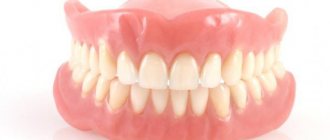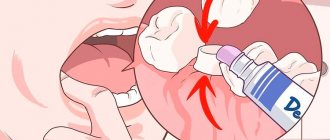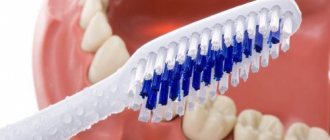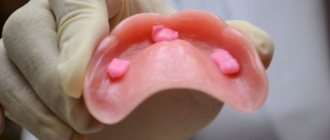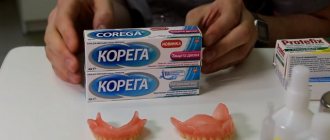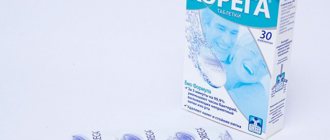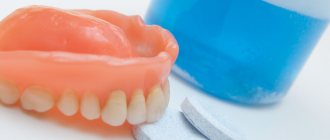About 50% of those who use removable dentures in everyday life indicate that the main problem in their use is insufficient strength of fixation in the oral cavity. This feature is the reason that when performing certain actions (eating, talking, laughing), the prosthesis can noticeably shift relative to its normal position.
To avoid such troubles, it is recommended to use special means that ensure high-quality fixation of dentures in the oral cavity.
Typically, when it comes to nylon and acrylic dentures, creams and gels are used. Gels are not inferior to creams in their functionality and differ from them only in consistency. Creams have a denser structure and are better suited for those who are just starting to use removable dentures.
Below we will consider the main means that are used for reliable and long-term fixation of dentures, their advantages and disadvantages.
ROCS
This drug was manufactured jointly by Russian and Swiss specialists and provides twelve-hour reliable fastening of the prosthesis, independent of the consumption of heated drinks and food.
Being distributed over the inner surface of the structure, this cream prevents small food particles from getting under the surface of the prosthesis. It should also be noted that the composition of this cream includes mint and menthol extracts, which significantly freshen breath and prevent the occurrence of unwanted odors.
Advantages
- Hydrophobicity. Cannot be washed off with any liquids.
- Lack of zinc element.
- Possibility of application to wet (not dried) dentures.
- The cream does not contain any artificial dyes or additives.
- Able to withstand the thermal effects of food, as well as drinks.
Flaws
- A high degree of thickness, which in some cases can complicate the uniform application of the cream.
- High price of the product.
In retail trade, the price for ROKS ranges from 250 to 400 rubles.
Lacalut
Lacalut is a product of German technology of traditionally high quality. This cream, according to manufacturers, is capable of providing reliable adhesion of the prosthesis to the oral cavity for a period of more than 24 hours.
The cream forms a protective layer between the patient’s mucosa and the prosthesis, which effectively protects the oral cavity from potential injuries and rubbing by the edges of the prosthesis. This is especially true for those who have just started using removable dentures.
Lacalut cream contains a substance called aluminum lactate, which has a pronounced anti-inflammatory effect. This cream can be applied not only to dried, but also to moistened removable dentures.
Advantages
- Provides gentle operation of prostheses, minimizing possible injuries and abrasions in the process.
- It has a pleasant taste and aroma.
- Provides reliable long-term fixation of the prosthesis.
Flaws
- There may be a slight weakening of the fastening strength during the consumption of various hot foods or drinks, such as tea or coffee.
- Relatively high price.
The cost of Lacalut adhesive cream ranges from 300 to 450 rubles.
"Protefix"
The cream of this brand ensures reliable fastening of the removable structure for up to 14 hours. Three different types of this product are produced, one of which, due to the absence of any foreign dyes and flavoring additives in its composition, is hypoallergenic.
Advantages
- Complete absence of foreign tastes and odors.
- High reliability of fixation.
- Economical.
Flaws
- Due to its liquid consistency, the fixative may leak out of the bottle if it is not held strictly vertically.
- Not a particularly convenient dosing system.
The cost of this drug varies depending on the volume of the tube, usually ranging from 150 to 390 rubles.
How to rinse your mouth correctly
In many ways, the results of the procedure are determined by the correctness of its implementation. These are the basic rules that dentists are asked to adhere to:
- Regularity. There is no point in rinsing your teeth and gums only when the urge arises. If the dentist says to use the solution every few hours, that’s what you should do. Otherwise, it will not be possible to achieve positive dynamics.
- Under no circumstances should the prepared medicine The optimal temperature is 36-40 degrees Celsius. If a hotter liquid is used, the affected area will heat up, and high temperatures are known to create suitable conditions for the further spread of pathogenic organisms.
- Do not swallow antiseptic. Most of the drugs in the group presented on the pharmaceutical market are not intended for internal use. They negatively affect the functioning of the gastrointestinal tract.
- You don’t just need to take the solution into your mouth and immediately spit it out, but hold it in the area of the affected tissue for about a minute. Such mouth baths are considered the most effective.
Using antiseptics wisely and giving preference to proven means, you can significantly bring recovery closer even with advanced dental diseases.
"Fittydent"
"Fittident" is considered one of the best drugs for fixing dentures in the oral cavity , however, if the patient has increased sensitivity of the mucous membranes, then during the periods when "Fittident" is used, unpleasant sensations such as burning and/or characteristic tingling sensation.
To ensure that these side effects are avoided, after the cream is applied, let it dry for about half a minute.
Advantages
- Long fixation time provided by this drug.
- Lack of distinct taste.
- After removing the denture, no traces of cream remain in the patient’s mouth.
Flaws
- Difficult to find in city pharmacies in small towns.
- The cream must be applied exclusively to the dry surface of the prosthesis.
- Very thick structure of the drug.
The cost ranges around 270 rubles.
Ointments for gums - anti-inflammatory drugs for the treatment of periodontitis
- Article reading time:
1 minute
The shelves of pharmacies are full of packages of therapeutic and preventive oral care products; advertising banners are smiling at people who, apparently, have overcome periodontitis with the help of those very bright boxes. But what is the reality? Patients are especially interested in ointments for teeth and gums in this regard, because the first thing that usually comes to mind when there is pain and redness is: “I need to anoint it with something...”. And then a fatal mistake is made! In the pharmacy you should look not for ointments for healing gums, but for gels, since the fatty base of ointments does not allow the active substances to penetrate the mucous membrane and have the desired effect. Gels are not so quickly swallowed with saliva and have time to act on the inflammatory focus. Any means for treating gums can only help with inflammation of the marginal gums (gingivitis), but if bone structures are affected, these drugs are used only in complex therapy. Applications and rinses alone will only smooth out the picture of inflammation, the disease itself will progress, and the patient will complain that the remedy helped and suddenly stopped working. The best effect will be achieved if you have your teeth professionally cleaned by a dentist before using the gels. The specialist will remove soft and hard dental deposits, which play a significant role in the development of gingivitis and periodontitis.
Popular remedies for treating gums
For a patient with periodontitis, it is important that the drug purchased acts quickly, is used sparingly and, preferably, is inexpensive. The price of ointments and gels for gums can vary within different limits, and a mini-review will help you figure out the rest of the properties.
- Holisal.
A combined action gel that has an analgesic, anti-inflammatory and antiseptic effect. It begins to act within 2 minutes after application and lasts for 3-8 hours. A tube of 10 g costs 300-400 rubles, but the product is very effective and efficient. An analogue is Mundizal gel, its price is less - 260 rubles. Both drugs are consumed quite economically.
- Kamistad.
Popular as a gel for gums during teething, it relieves pain in both the gums and tongue. The main components are lidocaine and chamomile extract. It is significantly inferior to Cholisal in anti-inflammatory properties, but is successfully used in infants, who do not require such a strong effect. A 10-gram tube can be bought for 250 rubles.
- Metrogil Denta.
The tandem of the antibiotic metronidazole and the antiseptic chlorhexidine is in itself quite effective, but still the dosage of metronidazole in the gel is not sufficient to completely relieve inflammation without additional treatment. In addition, the drug does not penetrate into tissues as well as Cholisal, so Metrogyl Denta is used in the initial stages of the disease. 20 g of gel in a bright, recognizable package costs 180 rubles, it lasts a long time.
- Solcoseryl gel.
An analogue of Actovegin, created from purified blood extract of young calves. It has a wound-healing effect, improves the trophism of damaged tissues, and is more often used after surgical interventions in the oral cavity and in case of injury from dental structures. For the treatment of periodontitis, it is still better to prefer narrowly targeted gum products. A 20-gram package can be found for 250 rubles.
- Asepta gel.
A product based on propolis, which has an antiseptic, regenerating and soothing effect. We cannot talk about the very high effectiveness of the drug, because it does not belong to the medicinal category. Rather, it can be used when it is not possible to get an appointment with a dentist and you don’t have any other means with you. The gel costs about 160 rubles.
- Asepta balm.
Although the drug is called a balm, in the oral cavity, thanks to special binding substances, it turns into a viscous gel and can be used for applications. The composition of the product is similar to the Metrogyl Dent formula, but the price of the balm is much less - 170 rubles. for 10 g
How can we sum it up? According to patient reviews, the drug Cholisal performed best; if you have financial difficulties, you can purchase Mundizal. A good solution would be to use special anti-inflammatory pastes such as Parodontax, antiseptic rinses and sprays in complex therapy, which reduce tissue bleeding and accelerate their regeneration.
How to properly use gels and ointments for gums?
All drugs for the treatment of periodontitis using the application method have their own characteristics of use and frequency of application, but the main rule remains unshakable - treatment of the gums should be done with clean hands (you can use a cotton swab). After eating, brush your teeth and squeeze a little gel onto your finger. Gently apply it to the affected area and avoid food or water for at least 30 minutes. There is no need to try to generously lubricate the gums - this will not increase the effect, but it is quite possible to get nausea from swallowing an antibiotic in the gel. The use of any ointments for gums at home does not replace qualified dental treatment, so it is reasonable to consider them as an aid to relieve symptoms and, of course, to prevent gingivitis and periodontitis.
"The president"
The prosthesis attached with this drug tightly adheres to the mucous membrane due to the formation of an elastic layer of high density, which prevents food particles from entering under the surface of the prosthesis.
The consumption of hot drinks, as well as food, in some cases can lead to a weakening of the fixing strength.
Advantages
- Larger volume compared to analogues.
- High strength of prosthesis fixation.
- Low cost of the product.
Flaws
- Strong foreign taste.
- Eating can weaken (sometimes quite significantly) the fixation.
The cost of the drug is approximately 250 rubles.
Possible causes of inflammation
Many things can cause gum inflammation, but most often the culprit is poor oral hygiene. If a person does not know about the existence of rinses, dental floss, or uses brushes of unsuitable hardness, then there is a high probability that food will accumulate in the spaces between his teeth, which is a breeding ground for bacteria.
Reactive gum inflammation is often triggered by the presence of tartar. First of all, it promotes the proliferation of pathogenic microorganisms. And the sharp edges of such formations easily damage the gums. The situation becomes worse under the influence of such factors:
- general weakening of the immune system due to systemic diseases, previous surgical interventions or infections;
- decreased local immunity after gum damage (wearing braces, hard bristles of a toothbrush);
- getting burns as a result of thermal or chemical exposure;
- deficiency of B vitamins, vitamin D or other micronutrients (poor diet or problems with the digestive system);
- endocrine pathologies (thyroid diseases, diabetes mellitus);
- unhealthy habits (tobacco smoking, alcohol abuse);
- taking certain groups of drugs (oral contraceptives, antihypertensive drugs, antidepressants, antibacterial agents).
If inflammation is present, the cause of the pathological condition must be determined. When contacting a dentist, you must inform him of all existing diseases, previous surgeries, or traumatic injuries experienced. If the cause is eliminated in time, this will protect against exacerbation of the disease in the future.
"Korega"
All components of fixing preparations from this manufacturer are hypoallergenic and do not cause any side effects when used as intended.
Advantages
- Corega cream is equally suitable for use with both dry and wet dentures.
- It is characterized by low allergic activity and ease of use.
- It has a very low cost.
Flaws
- A short period of full fastening, which does not exceed four hours.
- Not waterproof, washes off quickly.
- It comes to an end pretty quickly.
- During the absorption of food, the prosthesis may fall out due to the dissolution of this product.
- If you use Corega cream for quite a long time, swelling of the mucous membrane may develop.
The average cost of this cream does not exceed 300 rubles.
We would also like to note that in case of any complications associated with the use of dentures, you should immediately contact the VivaDent clinic.
Types of inflammation and possible symptoms
There are two main types of inflammatory processes in the gums:
Gingivitis. This is a shallow inflammation of the gums, in which the periodontal joints are not affected. Most often this means inflammation of the gum area between two adjacent teeth. Moreover, this pathology is not dangerous for the teeth themselves. It does not cause their mobility.
Periodontitis. With this pathology, inflammation spreads to tissues that are located deep (bone structure, tooth roots). In this case, periodontal pockets often form. They accumulate food particles and soft plaque, which over time aggravates the situation.
With periodontitis, decay processes often occur, and the teeth become very mobile and there is a high risk of their loss. Both diseases can occur locally or affect the entire periodontium. A limited local inflammatory process most often occurs against the background of injury. General inflammation is usually caused by other negative factors.
It is quite easy to recognize gum inflammation by the following symptoms:
- hyperemia, tissue swelling;
- increased sensitivity of periodontal tissues;
- the appearance of bleeding;
- loose gums;
- bad breath.
If periodontitis is advanced, then the appearance of purulent discharge and a feverish state is possible. With ulcerative gingivitis, ulcers appear on the surface of the soft tissues. Atrophic gingivitis leads to exposure of the tooth necks. This in turn makes teeth more sensitive to hot or cold food.
